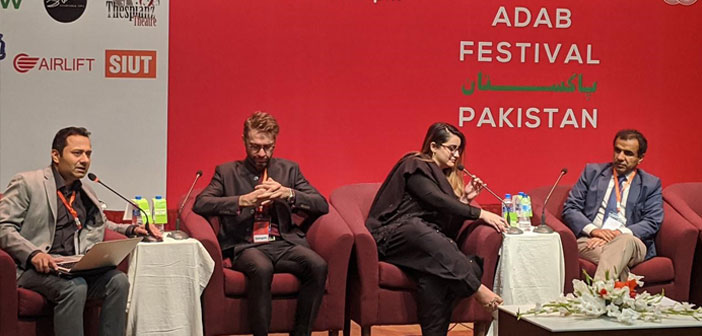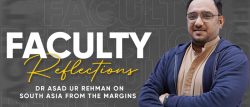The second annual Adab Festival of Karachi, a three-day literary event at the Karachi Arts Council, was recently held from January 31st through February 2nd. This year the festival featured a discussion panel titled “Identity and Ideology in Global Politics.”
Dr. Aqdas Afzal, Program Director for the Social Development and Policy unit at Habib University (HU), served as the moderator. He was also joined by fellow HU faculty Dr. Massimo Ramaioli and Sadia Mehboob as well as by Dr. Manzoor Ahmad, Dean of Faculty of Management and Social Sciences at the Lasbela Univeristy of Agriculture, Water and Marine Sciences.
The panel wanted to explore the reasons behind the recent rise of “identity politics” in different countries around the world. According to the panelists, a wave of right-wing populism seems to have swept the globe over the past few years–from the somewhat stunning election victory of Donald Trump in United States to Narendra Modi’s Hindutva-based nationalism in India; from Javier Bolsonaro’s unrepentant appreciation of Brazilian military regime, to the entrenchment of illiberal regimes in Russia and Turkey. Identity politics has also swept across Europe, where right-wing political movements and parties are gaining electoral successes across the continent—particularly in Italy, France and, to a lesser but significant degree, in Germany.
How can we understand such significant social change, the panelists wondered? Panelists agreed that such complex problems are not amenable to quick simplifications. Dr. Afzal pointed out that the rise of identity politics signals the waning of the ideological divisions that marked the 20th Century—like liberalism, socialism, etc.
He underscored the fact that the world is no longer becoming “flat.” Rather, instead of globalization, many nations are now actively contemplating protectionist trade policies. Sadia Mehboob argued that the very process of identity formation necessitates the formation of an “other.” Racism, she also argued, must be considered part of this issue.
Dr. Ramaioli maintained that neoliberal ideas have now become dominant in the world. Neoliberal thinking has led to worsening economic inequalities as well as to the dismantling of the European welfare state, which, in turn, has heightened people’s sense of insecurity. These heightened insecurities may be forcing people to revert to parochial and inward-looking identities, Dr. Ramaioli concluded.
The moderator, Dr. Aqdas Afzal, concluded the session with a discussion on the resilience and future of the present political and economic institutions, both domestically (as in liberal democracy) and internationally (as the United Nations, the International Monetary Fund and the World Trade Organization, to name a few). The panelists’ concluding remarks focused on highlighting the changing nature of global economic order behind the resurgence of identity politics in the last few years.




